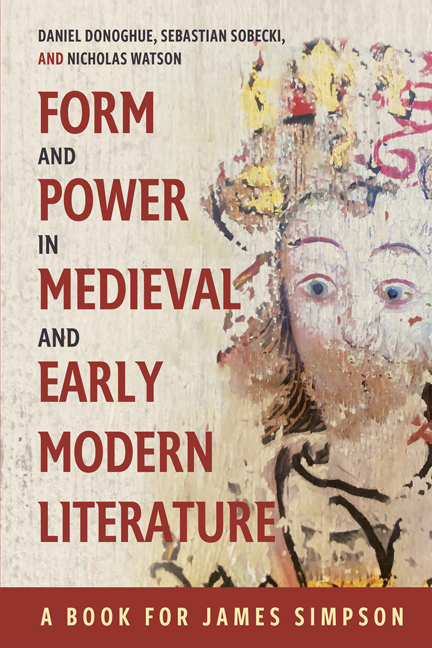Book contents
- Frontmatter
- Contents
- List of Illustrations
- Contributors and Editors
- Acknowledgments
- List of Abbreviations
- Simpson: An Interim Report
- PART I THE HERMENEUTICS OF RECOGNITION
- PART II GENRE AND FIGURE
- PART III CULTURE AND INSTITUTIONS
- PART IV REFORMATIONS
- James Simpson’s Publications from 1984 to 2024
- Bibliography
- A Note on the Bloomfield Conferences
- General Index
- Tabula Gratulatoria
15 - The Letter Kills but the Spirit Gives Life (2 Corinthians 3:6): Or, What Happened to Enemy Love?
Published online by Cambridge University Press: 17 May 2024
- Frontmatter
- Contents
- List of Illustrations
- Contributors and Editors
- Acknowledgments
- List of Abbreviations
- Simpson: An Interim Report
- PART I THE HERMENEUTICS OF RECOGNITION
- PART II GENRE AND FIGURE
- PART III CULTURE AND INSTITUTIONS
- PART IV REFORMATIONS
- James Simpson’s Publications from 1984 to 2024
- Bibliography
- A Note on the Bloomfield Conferences
- General Index
- Tabula Gratulatoria
Summary
… onely add
Deeds to thy knowledge answerable, add Faith,
Add Vertue, Patience, Temperance, add Love,
By name to come calld Charitie, the soul
Of all the rest …
(Milton, Paradise Lost, XII.581–85)This brief essay explores some central puzzles in Christian doctrine and practice. As its title indicates, it addresses hermeneutics and violence, writing and killing. It does so by attending to Jesus Christ's challenging but luminous teaching on enemy-love. And despite its brevity, it also seeks to suggest why diachronic study is as important as James Simpson has been showing for many years and across many substantial books. Purely synchronic history, encouraged by institutionalized period divisions in university departments of history and literature, diminishes our ability to understand the historical moment or writer that the synchronic specialist studies. One common consequence is the abundance of false claims about origins, innovations, and novelty. It begets an inability to discern, let alone study, the complex ways in which traditions develop, transform, and encounter rivals, either assimilating them or being defeated by them and, in the process, becoming unintelligible. Of course, diachronic work is as risky as it is demanding. The demands are obvious, but what are the risks? The risks are those of working against the specialized compartmentalizations of period and coterie boundaries. We can only be grateful that James Simpson has so exuberantly and so eruditely taken these risks.
I should also note that this essay is in dialogue with a central preoccupation of James Simpson's work from Burning to Read to Permanent Revolution: namely, the relation between the distinctive hermeneutics of the Reformation, and the practices of persecutory violence (and vehement legitimizations of such violence) germane to the period. In Permanent Revolution Simpson shows, often in dismaying detail, how the Reformation continued to produce an “unending, uncompromising, physical, cultural, and psychic violence grounded on an entirely new and revolutionary understanding of divine textuality” (p. 260). He demonstrates, as in his discussion of Bunyan's Grace Abounding (pp. 292–98), “[t]he violence unleashed by Lutheran and Calvinist reading programs,” first against Catholic Christianity but then becoming “a practice of permanent revolution, dividing Protestantism from itself much more vigorously than it divided Protestantism from Catholicism” (p. 263).
- Type
- Chapter
- Information
- Form and Power in Medieval and Early Modern LiteratureA Book for James Simpson, pp. 275 - 292Publisher: Boydell & BrewerPrint publication year: 2024



